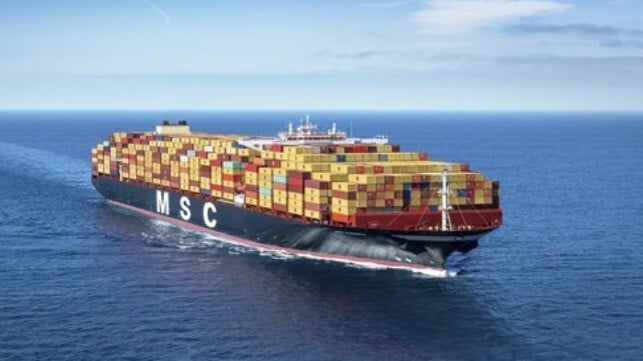MSC and DB Schenker Launch Model Biofuel Program to Reduce Emissions

MSC Mediterranean Shipping Company and a freight forwarder have struck an innovative deal that calls for one of the largest uses of biofuel addressing the growing concerns of shippers to reduce their total carbon footprint. Pressure has been growing on large shippers to address carbon emissions across their supply chains including elements such as shipping which so far has been largely beyond their control. Under the agreement, MSC is creating a carbon reduction program broadly available to the shipping customers of DB Schenker that results in an immediate reduction in emissions. It also provides a model for others to follow.
Individual shipping lines have been testing biofuels for years and some have even offered the first offset programs for individual customers. Through the agreement with DB Schenker, MSC is providing a much wider solution for shippers that addresses concerns and avoids issues such as disputes between shipowners and charters over the use of biofuel. The program also seeks to address concerns over the origins of the biofuel.
“We are doing this because we firmly believe it is the right thing to do and are therefore paying for biofuel purchases in advance,” said Thorsten Meincke, Global Board Member for Air & Ocean Freight at DB Schenker. "One thing is certain, the more customers demand climate neutrality throughout supply chains, the faster we achieve clean container ocean freight."
DB Schenker has committed to the purchase of 12,000 metric tons of a second-generation biofuel to be used by MSC’s containerships. The biofuel will be blended between 20 and 30 percent, resulting in approximately 50,000 metric tons of blended biofuel to be used across MSC’s fleet. The carrier estimates that it equates to the shipment of around 30,000 TEUs with net-zero CO2 emissions, depending on how the fuel is used during navigation.
The amount of biofuel purchased is enough to save 35,000 metric tons of CO2 equivalents (CO2e) along the entire production chain (well-to-wake) in the market. That will be passed along to DB Schenker and its customers for all of its consolidated cargo, less-than-container load (LCL), full-container-load (FCL), and refrigerated containers, carried by MSC. The difference between this program and other carbon offsets is that those programs focus on future emission reductions outside the shipping industry whereas the purchase and blending of the biofuel will result in immediate and direct reductions in emissions from shipping.
“Decarbonizing ocean freight cannot be achieved by a single player and requires collaboration between shipping and logistics companies and their customers,” said Caroline Becquart, Senior Vice President of MSC. “MSC Biofuel Solution is our first certified carbon insetting program that reduces emissions in our customers’ supply chains, accelerating the energy transition by creating demand for net-zero-carbon shipping and delivering direct CO2 savings.”

that matters most
Get the latest maritime news delivered to your inbox daily.
MSC has been actively testing and using biofuel as a drop-in blended into fuels for several years and points out that the biofuel is not only well-regarded as a decarbonization transition fuel but can be used for regular ocean freight operations without adjusting a ship’s infrastructure or supply chain.
Environmentalists have been critical of some of the early biofuel efforts pointing out that the waste cooking oil used in the production can be high in palm oil which is associated with deforestation. MSC highlights that for this program it will be using a second-generation biofuel, also known as advanced biofuel. It ensures at least 80 percent reduction in CO2e emissions (well-to-wake). The oil is also guaranteed to be palm oil free, including no palm oil waste and no indirect land use change. The oil is devised from used cooking oil and becoming increasingly popular in the shipping industry as a near-term opportunity to improve emissions.
